To achieve a glossy floor, ceiling, wall or even counter top, the surface will have to be converted from its concrete form and exposed to a Bonded Abrasive Polished Concrete, Burnished Polished Concrete, or Hybrid Polished Concrete. The results either, a dust-proof, glossy surface that is easy to maintain and clean with a custom brightness that is abrasion resistant and most of all appealing to look at.
Classification of polished concrete
Bonded abrasive polished concrete is achieved using a mixture of abrasive grains, fillers and bonding materials such as vitreous; resin, rubber, shellac, epoxy, magnesite and other bonding materials referred to as plastic to your surface until the desired class of aggregate exposure of gloss is achieved.
You can also choose burnished polished concrete to achieve the gloss where the concrete surface goes through friction rubbing using an abrasive pad.
Optionally, one can use a topical polished concrete or rather Hybrid Polished Concrete which simply uses a liquid coating on a concrete floor surface.
Polishing concrete market in Africa
According to a report done by market and market, by 2022, the Decorative market will be worth US $13bn. There is a rise in demand for decorative concrete. This is attributed to the renovation & remodeling activities, growth in interest of consumers toward interior decoration.
The growth in demand from the residential industry also provides an opportunity for market growth, especially in the emerging Asia-Pacific and Middle Eastern and African regions.
Scott Mouritsen of PrepTech systems believes that the Polishing concrete business is at an early stage but the business is promising.
He adds that with and more large factories move their production site from Asia to Africa, there will be a wide application for polished concrete in the next 10 years.
The Executive Director at JuNeng Nigeria Limited, a polishing concrete service provider in Nigeria and other West African countries, Darlington Agbiogwu says that the Polishing concrete business have seen a risen popularity since it’s entry to the market in 2010.
Mr. Agbiogwu explains that Nigeria and other African countries are gravitating towards modern, crisp, luxury interiors because the floors offer a number of benefits, such as affordability, desirable aesthetics, hygiene and versatility. The company forsees a growth in the market as more and more people embrace the advantages that this floor structure has to offer.
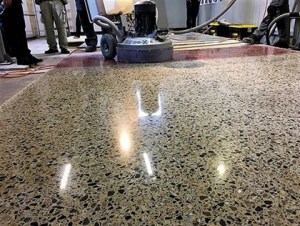
According to Glen wienand, Klindex South Africa Director,the African market is growing and untapped. Klindex has for one been involved in large projects such as the Julius Nyerere International Airport in Dar Es Salaam. The project involved grinding and polishing a 30000 sqm area.
Brian Clark believes that polishing concrete originally targeted residential market however acceptance in commercial (Retail) and industrial helped drive growth and it’s a current preference in large brand stores such as Woolworths and Massmart where they have offered their services
Brian Clark is the The director of Diamond Products Company, the exclusive distributor for Blastrac concrete grinder and polishers in Sub Saharan Africa.
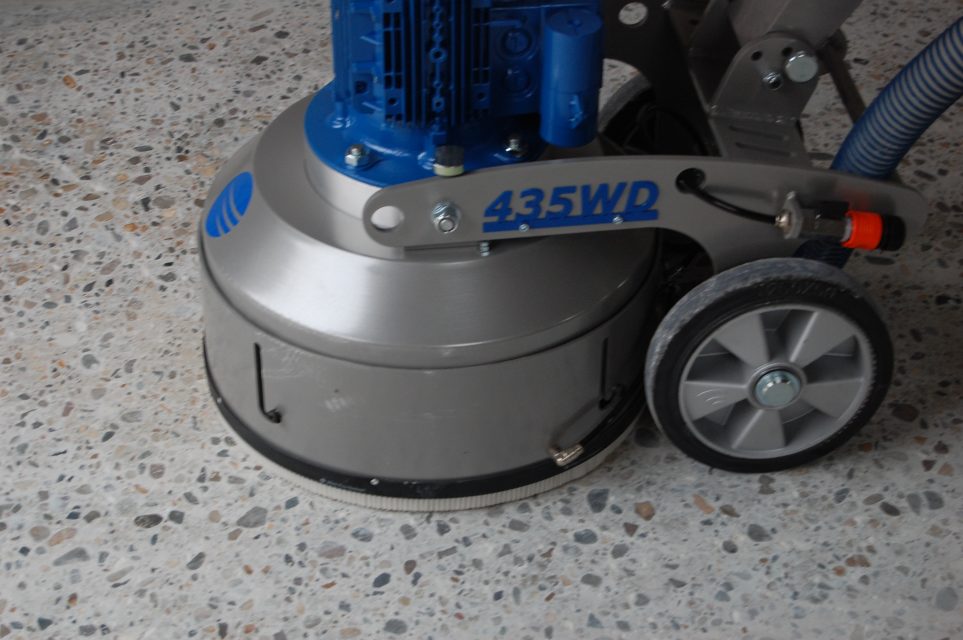
According to a report done by market and market, by 2022, the Decorative market will be worth US $13bn There is a rise in demand for decorative concrete. This is attributed to the renovation & remodeling activities, growth in interest of consumers toward interior decoration.
The growth in demand from the residential industry also provides an opportunity for market growth, especially in the emerging Asia-Pacific and Middle Eastern & African regions.
Application of polish concrete
Polishing concrete can be done using wet or dry methods. Dry polishing is mostly used in the industry because it’s faster, more convenient, and environmentally friendly.
Wet polishing uses water to cool the diamond abrasives and eliminate grinding dust. This is because the water reduces friction and acts as a lubricant, hence, it increases the life of the polishing abrasives. The biggest disadvantage of wet polishing is the cleanup resulted from the slurry produced.
Step by Step process
1.Choosing the right equipment
Polish concrete uses a multi-step process requiring use of the proper equipment. Mr. Mouritsen emphasizes on machine quality, efficiency and service as key elements.
“Having the right quality machine for the job helps in saving time”. He adds that one should not waste time due to bad service rather, should select the right partner for the supplies.
Preptech Machines have supplied their concrete grinding equipment’s in Alexandria/Egypt, Johannesburg and Cape Town in South Africa, Kampala in Uganda, and Nairobi in Kenya and Port Louis in Mauritius.
Per Sandström, the Business Development Manager, Surface Prep at Husqvarna Construction Products which manufactures HTC grinding and polishing equipment’s that have distributors in Namibia, Botswana, Zimbawe and Zambia says that having a good training yields good results.
Mr. Sandström insists that good training helps one to get to know how the machines work, what tools to use and which steps to take so as to get the best end result.
Another consideration to make is the presence of local dealers and what service facilities and stock of spare parts, tools and machinery they have.
Husqvarna has been involved in projects such as the Moses Mabida stadium in Durban where they polished an outdoor area of more than 100.000 sqm. They have also managed to provide 1,500 grinding machines in Zanzibar.
Silas Katonyera, the director of smart floors Africa, a service provider and the official distributor of STI Prepmaster concrete grinders in America and Sub-Saharan Africa, says having the correct specification,correct placement and correct equipment and chemical are the most important considerations.
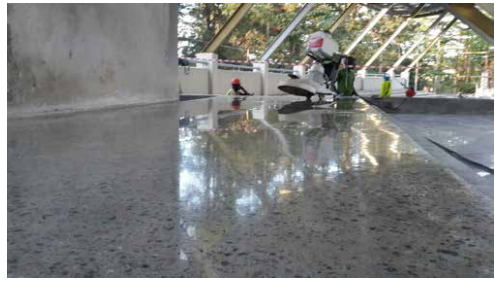
The director whose company has been actively involved with project such as polishing the 15,000 sqm Mulago Hospital in Uganda adds that one needs correct placement in order not to have a wavy floor finish and have the proper Equipment and chemical to execute the work properly.
2.Surface Preparation
There are two surface preparation types; a new concrete slab and an existing concrete slab. A new concrete slab will involve less costs, since the mixing and the pouring of the concrete can already include some of the initial steps in polishing such as the addition of the decorative finish.
MACTOOL sales director,Geoff Mclea says that the condition of the concrete is extremely important when deciding to polish concrete. He adds that one should consider the concrete mix design if it is new concrete or if its is existing slab what strength it is. A minimum of 25MPA strength is required.
MACTOOL, the official distributor of Scanmaskin concrete grinding and polishing equipment ship their products from South Africa and supply them across Africa.
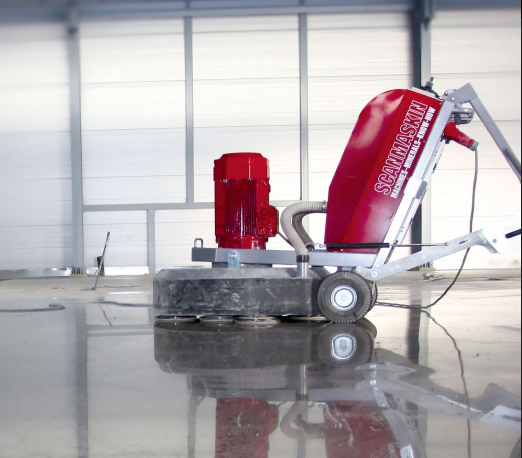
Geoff adds that it is important to also develop a polishing system that stipulates the stages and chemicals to be used that gets the best results.
Evolution concrete floors in South Africa say that it’s best to get the company involved from the beginning for them to advise you on how best to place the concrete.
Willem Eiman, the director of Evolution concrete states that when placing concrete, 70% of the outcome goes to the first process of pouring concrete. Once the concrete has been placed in an even and leveled manner, they grind off 3 to 6 mils.
Once this is done, they put a penetrating filler or a stain resistant filler that can last five to ten years.
Although Evolution concrete floors is located in South Africa, the company has offered their services in Zambia and Botswana.The company has sealed a 1,130sqm area and 1142sqm area over the recent past in South Africa.
3 Surface Grinding
As soon as the topping has hardened and is ready to work-up, the grinding process begins with diamond grinding machine, and progressively repeated, each time increasing the fineness of the grit until it reaches the 120-grit metal segment.
Mr. Clark says that before grinding, the prepared surface should be free of all dust and oils and should be dampened but surface dry. He further adds that a good guide is to see how quickly splashed on water is absorbed. If immediately, it’s too dry.
After the first grinding with a 120-150 grit diamonds one can apply the Densifier liberally such that the concrete is saturated but puddles are not formed. After the densifier dries up, one can start the polishing process.
Diamond products have provided their services in Mali, Ghana and Nigeria and have supplied Blastrac grinders in Kenya, Uganda, Rwanda, Tanzania, South Africa, Botswana, Zimbabwe, Zambia, Mozambique, Namibia, DRC and Malawi.
Pavlos Gakis, Metabo South Africa’s sales manager says that before grinding the most important thing to consider is the finishing one wants. He further adds that there are different removable diamond discs ranging from coarse to fine one can use depending on the type of finishing they want.
Metabo hand held concrete grinders and polishing have offered their equipment in Botswana. The hand held concrete grinders are ideal when polishing and grinding walls and ceilings. The grinding, and consequently the polishing, can be done either dry or wet.
4. Surface Densifying/Sealing
During the grinding process, and prior to the polishing, a sealing solution is applied to fill up any cracks, holes or distortion that may have been created on the surface from the initial grinding.
Densifier hardener solution is added to the concrete surface to further solidify and strengthen the surface.
Glen from Klindex adds that it is important to lace the concrete for at least one week before grinding and after the grinding with a metlabound diamond
After achieving the surface smoothness level from the metal grinding, the polishing begins. The polishing cycle is repeated progressively as in grinding.
5. Surface Polishing
After achieving the surface smoothness level from the metal grinding, the polishing begins. The polishing cycle is repeated progressively as in grinding.
Paola Rota, the sales manger for Achili a concrete floor grinder manufacture with distributors in North Africa and Kenya and direct sales to Zambia, Congo, Ghana and Uganda says that grinding of a floor is made using abrasive tools and consists of four phases: levelling, roughing, closing and finishing.
Paola further adds that after the operations the floor is smooth but still opaque requiring a polishing which generally is made of two stages.
The floor should be polished using a machine that uses an an oscillatory movement. “A proper oscillation will ensure an optimal flatness of the surface,” she added.
An important tip is to make a first pass in the vertical direction and a second in the horizontal direction, working every time on a space of about 2m2.
Maintenance of the polished concrete surface
Although the polished concrete surface are durable if not well maintained, they can easily lose their shine. However, the maintenance process is easier than any other type of decorative concrete floors.
Some basic maintenance tips include regularly cleaning the polished concrete surface with a clean mop and water. Whenever your dusting the polished concrete surface us microfibre mop. Another maintenance tip is ensuring you clean any spill and stain as soon as they appear.
Don’t let the cleaning agent become dry, or it may increase your efforts to clean the floor. Also remember to use a pH neutral cleaning solution.

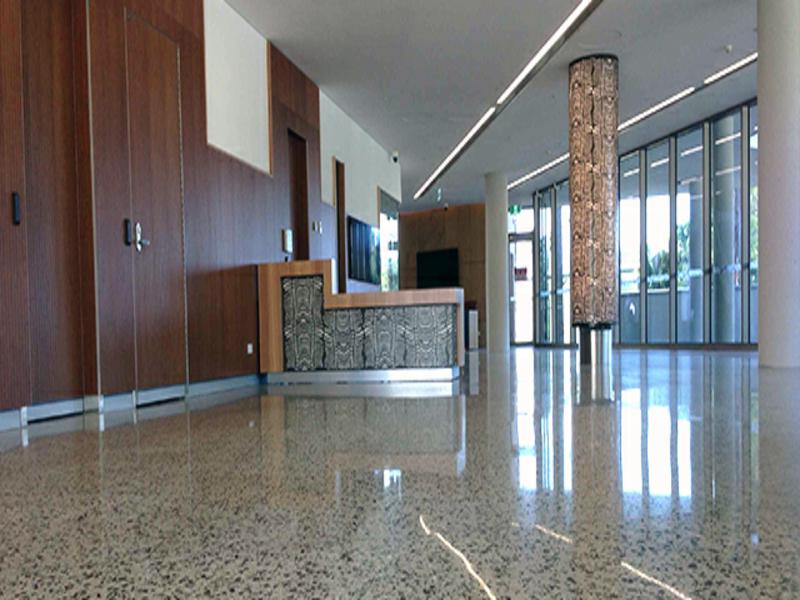
Thanks for explaining that dry polishing is typically used because it is faster. I wonder what would be better for my basement floor. On one hand, I like the idea of it being faster. I would let the experts decide, though, as I don’t know much about the process.